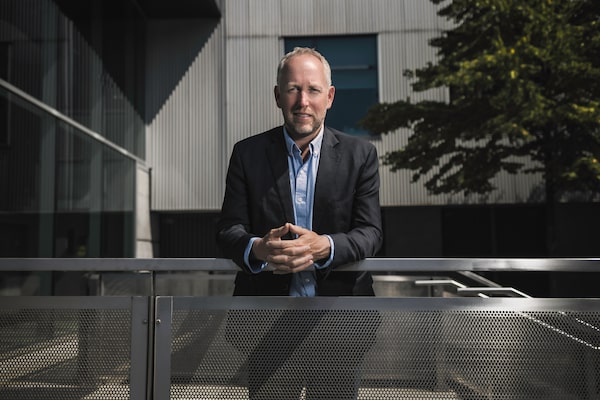
SemiosBio CEO and founder Michael Gilbert.Handout
The founder of Canada’s largest agriculture technology company, Vancouver’s SemiosBio Technologies Inc., is resigning as chief executive after deciding he prefers to govern companies, not run them.
Michael Gilbert will step down on Dec. 31 to focus on his board positions including his roles at Semios and two Canadian startups in which he has invested, including seaweed farming company Casacadia Seaweed Corp. The medical researcher-turned-entrepreneur, who owns between 20 and 30 per cent of Semios, told the board of his desire for change in early fall.
“I find myself more interested in governance than operations,” Mr. Gilbert, 49, said in an interview. “It is difficult to do both. I want to make sure I don’t get in my own way. Given where my heart is at, I want to find a CEO who’s really driven about operations who can take this company to the next level, because it’s in my best interest.”
Mr. Gilbert, who has the right to name two of Semios’s five directors and co-nominate another two, said he will be actively involved in the search for a successor, which is being led by recruiting firm True Capital Partners, and help with the leadership transition. Semios independent director Ed Quilty, who sold his clean technology firm Aquatic Informatics Inc. to Danaher Corp. in 2020, will lead the company until the new CEO is hired.
“Michael has had an incredible run, it’s unique for someone to go from an idea through the early stage valleys of death that all startups have,” Mr. Quilty said in an interview. “He’s been amazing to watch and has had very few hiccups along the way.”
Leah Lawrence, CEO of federal agency Sustainable Development Technology Canada, which has funded Semios, said: “There is a myth that Canadian entrepreneurs don’t have fire in the belly, that they don’t think big. Michael has shown this just isn’t true. He leaves Semios in a strong position.”
Semios, founded in 2010, became a specialist in “precision farming” technology, combining artificial intelligence, wireless sensor technology and a chemistry trick to prevent the spread of insects that damage high-value crops such as nuts and fruits. It is one of several Canadian companies, including Farmers Edge Inc., and Telus Corp., looking to digitize the global agriculture business and compete with chemical giants Monsanto Co. and DuPont de Nemours Inc.
Semios’s signature offering is bug-control technology that doesn’t use insecticides but non-toxic synthesized chemicals that fool pests into not reproducing. The Semios spray mimics pheromones, natural chemical signals that the insects send to one another. Semios’s simulated pheromones are sprayed at intervals from canisters mounted in orchards and vineyards to confuse males, which fly into a fog of phoney pheromones looking for females and reach the end of their lifespan before propagating. Semios sells its systems on a subscription basis, meaning farmers don’t have to lay out big sums for technology they’ll have to replace at their own cost.
Semios in early 2020 raised $102-million in equity from Morningside Group, a Boston private equity firm controlled by Gerald and Ronnie Chan, heirs to a Hong Kong property fortune. Morningside invested another $100-million last year, valuing Semios in excess of $1-billion.
The capital was largely intended to fuel an acquisition campaign after farmers told Mr. Gilbert they were tired of dealing with multiple technology startups and preferred to work with an integrated vendor.
Semios secured the financing before capital markets turned sharply down for technology companies this year and has bought three companies: Australia’s Agworld Pty Ltd., which provides enterprise resource planning software to farmers; San Francisco-based Altrac, which makes control systems that turn farm wind machines on and off; and Centricity, a Wenatchee, Wash.-based startup that helps farmers manage data around compliance and traceability for crop inputs.
Semios has 300 employees and expected 2022 revenues of $75-million, up 20 per cent from 2021, Mr. Gilbert said. He said the downturn both in technology but also specifically in agtech, as soaring fertilizer prices have hit farmers – should create favourable conditions for more acquisitions.
“A lot of companies that didn’t raise capital in time will be ready to be acquired” in the next 18 months, said Mr. Gilbert. “That’s what we’re watching for” – and prepared for, with $100-million remaining from its fundraising efforts.
 Sean Silcoff
Sean Silcoff